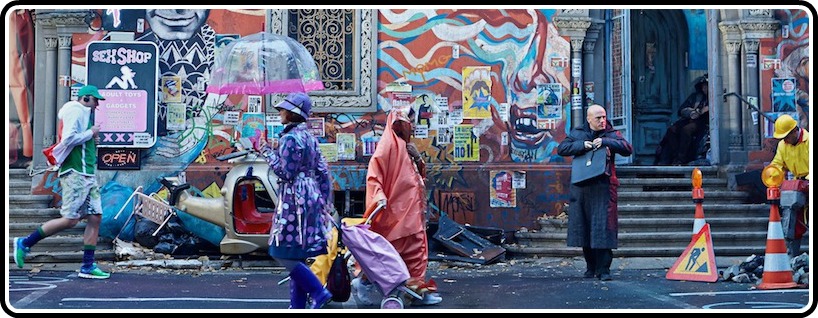
I feel kind of bad for Terry Gilliam. Not because his new movie, The Zero Theorem, is bad (which it isn’t), and not because I think he’s a bad director (which he isn’t). I feel bad for Gilliam because he occupies a certain exclusive group of creative people whose lofty ambitions unnecessarily outweighs their talent. Terry Gilliam is the type of guy who is so bursting with energy, ideas, and new ways to look at the world that sometimes people are either not on the same wave length yet to enjoy whatever he puts out or willfully ignorant of the message.
I should say that Gilliam isn’t overly didactic in his message, whatever it may be. That message is usually nestled in the weird and wonderful cinematic worlds that emerge from the mind of this auteur in ways that are perhaps only matched by the idiosyncratic creations of someone like Wes Anderson. But where Anderson’s twee creations skew towards the self-deprecating and the nostalgic, Gilliam has a decidedly sinister bent; one that takes a close look at the world we live in and posits how far down we could potentially fall. Gilliam’s last few movies may have attested to the fact that he is a struggling genius who may be too far gone, and yet The Zero Theorem perhaps purposefully harkens back to his most celebrated directorial effort (Brazil) as a way to comment on the changing contemporary digital age and man’s individuality within an increasingly connected world.
Christoph Waltz plays Qohen Leth, a loner programmer in the not-too-distant future who crunches numbers for a massive conglomerate called Mancom. Leth waits around after his work day is over for a phone call he thinks will tell him the meaning of life, and as he becomes increasingly paranoid at work about missing the call he puts in a request to his supervisor Joby (David Thewlis) who must tell the omnipresent boss named “Management” (in a little cameo by Matt Damon) that Leth will be more productive working from home. Leth is then given the task of solving the titular “Zero Theorem,” a mysterious and legendary mathematical formula that allegedly posits the world is meaningless. He holes up in an old converted cathedral he has turned into his home and must crunch massive amounts of data culled from every worker at the company in order to solve the equation.
All of the bureaucracy and technology is but a place setting for Gilliam to run wild in this quasi-dystopian future filled with constant personalized advertisements, people glued to their phones or tablets or screens, and the emerging reality of virtual experiences. This sort of message never becomes heavy handed, mostly because of Waltz’s equally hilarious and sad performance as Leth, but also because the subject matter is squarely within Gilliam’s wheelhouse.
This obsession with work and finding meaning is cleverly and unobtrusively updated from Brazil’s analog-inflted metropolis to Leth’s confined corner of the world that is defined by almost complete digital immersion. Whatever human interaction Leth has is met with awkwardness and an uneasy tension. Eventually with the help of Management’s son Bob (Lucas Hedges) and an Internet call girl named Bainsley (Mélanie Thierry) he begins to trust the validity of companionship and the interactions between people by seeing the reality of the connections and disconnections all around him.
The second half of the movie tends to amble, and maybe gets into too much pseudo-philosophical rambling that never really adheres to the film’s solitude versus digital globalization themes set up in its first half. But even when it stretches on a bit too long, Gilliam’s madcap world is still a devious delight to be in, all the way down to its painfully ironic ending—an ending, I might add, that few besides Gilliam could get away with.
The Zero Theorem isn’t so much a return to form or a re-hashing of old ways for the director. Instead it is a program update, a way to bring those isolating feelings of technological progress and hollow human identity he meant to get across in 1985 with Brazil into the 21st century. It isn’t as grand a statement or tragedy as Brazil, but this spiritual successor still gives its audiences a lot to chew on. Mostly it makes me think that maybe I don’t feel so bad for Gilliam after all.


